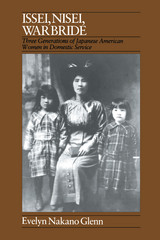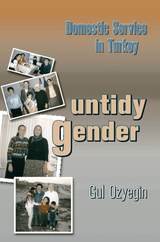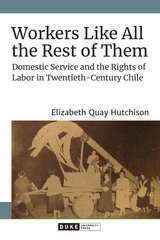4 books about Domestic Service

Dirty Work
Domestic Service in Progressive-Era Women’s Fiction
Ann Mattis
University of Michigan Press, 2019
Dirty Work sheds light on the complex relationships between women employers and their household help in the early twentieth century through their representations in literature, including women’s magazines, conduct manuals, and particularly female-authored fiction. Domestic service brought together women from different classes, races, and ethnicities, and with it, a degree of social anxiety as upwardly mobile young women struggled to construct their identities in a changing world. The book focuses on the works of Charlotte Perkins Gilman, Edith Wharton, Gertrude Stein, Nella Larsen, Jessie Fauset, Anzia Yezierska, and Fannie Hurst and their various depictions of the maid/mistress relationship, revealing “a feminized and racialized brand of class hegemony.” Modern servants became configured as racial, hygienic, and social threats to the emergent ideal of the nuclear family, and played critical rhetorical roles in first-wave feminism and the New Negro movements. Ann Mattis reveals how U.S. domestic service was the political unconscious of cultural narratives that attempted to define modern domesticity and progressive femininity in monolithic terms.
[more]

Issei, Nisei, War Bride
Three Generations of Japanese American Women in Domestic Service
Evelyn Nakano Glenn
Temple University Press, 1988
Three Generations of Japanese American Women in Domestic Service
Evelyn Nakano Glenn
"A richly detailed and sophisticated examination of...how historical and economic forces restricted women's lives and how women devised strategies for dealing with their plight."
--Canadian Woman Studies
In this unique study of Japanese American women employed as domestic workers, Evelyn Nakano Glenn reveals through historical research and in-depth interviews how the careers of these strong but oppressed women affected the history of Asian immigration in the San Francisco-Bay Area. Three generations of women speak in their own words about coping with degraded employment and how this work related to family and community life.
The disproportionate concentration of Japanese American women in domestic service from the early part of this century to the present resulted from their status as immigrants and women of color in a race and gender stratified local labor market. The three generations covered by this study--pre-1924 immigrants (issei), first American born generation (nisei), and post-World War II immigrants (war brides)--were subjected to multiple forms of oppression but were not appendages of men nor passive victims. Dr. Glenn shows how their struggles to achieve autonomy, dignity, and a suitable livelihood were essential to the survival of the family and the community.
Although unique in many ways, the situation of the Japanese American woman has important parallels with that of other women of color in the United States. Ironically her role as a domestic cast her in a menial, degraded job but often elevated her to the position of valued confidant to her employer. Issei, Nisei, War Bride is the first study to offer a sociological/historical perspective on these women. It addresses issues about the nature of labor systems in capitalist economies, the role of immigrant and racial ethnic women in those systems, and the consequences of participation in race and gender stratified systems for minority families and communities.
Reviews
"A beautifully written, well-organized, and sociologically rich study of three generations of Japanese-American women who worked as domestics. Glenn's study fits well into a women's studies collection, particularly with those materials focusing on immigrants or the working class."
--Choice
"... A much welcome contribution to the literature on women and work and on Japanese American women, in particular. Glenn has artfully combined a rich case study approach with detailed sociodemographics in an historical framework.... Glenn writes well and skillfully incorporates detailed historical and demographic facts with a descriptive style. The presentation of labor statistics is excellent.... This book is an important contribution, not only to Asian American Studies but to women's studies and the literature on labor and immigrant groups."
--Amerasia Journal
"A revealing view into the role of Japanese women immigrants in the United States not only as domestic workers but also in their family lives. This study is enlivened by the life stories and quotations from the women themselves..."
--Edwin O. Reischauer
"This work is a valuable contribution to the literature on immigration and an important addition to the literature on occupations. It contains a fascinating and highly readable account of the array of perspectives on work and family that Glenn was uniquely positioned to collect from Japanese women and provides an extremely useful study for those who teach women and work, gender roles, and sociology of occupations courses."
--Arlene Kaplan Daniels
About the Author(s)
Evelyn Nakano Glenn is Associate Professor of Sociology at State University of New York at Binghamton.
[more]

Untidy Gender
Domestic Service in Turkey
Gul Ozyegin
Temple University Press, 2000
"A sophisticated and sensitive text on domestic service in Turkey that singles itself out by a powerful account of the micro-sociology of power. It engages the reader in much broader debates about the mutual relations of class and gender, the role of patriarchal controls in shaping informal female labor markets and the management of status differentials by women in their daily lives. An important scholarly contribution written in a lucid and accessible style."
--Deniz Kandiyoti, School of Oriental and African Studies, University of London
Untidy Gender takes readers into the interconnected worlds of Turkish maids and the women who employ them, tracing the incorporation of rural migrant women into the interiors of the domestic spheres of the urban middle-classes. Firmly grounded in data collected through a representative survey of 160 domestic workers, in-depth interviews, and participant observation in the kinship-based communities of domestic workers, this book forges a new understanding of the complex interaction between gender and class subordination.
Ozyegin traces the lives of two kinds of workers; those from the squatter settlements who work in a number of locations, and those who live with husbands employed as "doorkeepers" or building superintendents in the basements of middle-class apartment buildings. In a literal "upstairs, downstairs" arrangement, the latter women sometimes take on apartment cleaning for clients in the building.
At the center of the book are a number of ironies about patriarchy. On the surface, husbands have absolute control over whether or not their wives work, but some women work in secret, and those "doorkeeper" husbands who allow their wives to work often provide child care themselves. Ironically, the very constraints on the spatial and social mobility of the women creates a labor market in which domestic workers' labor is expensive and not readily forthcoming, which, in turn, gives them a degree of power in negotiating their relationship with their middle-class employers.
Untidy Gender offers insights not only into the gender and class dynamics of Turkish society, but contributes to the refinement of central terms of feminist scholarship and research on work in the informal sector, cross-class relations between women, gender and class inequality, and women's experiences of modernity and urbanization. The author ends with a personal account of her own difficulties with the class tensions of the maid-employer relationship.
"Untidy Gender makes contributions to a large number of debates in several social science fields and sub-fields. And it does so on an extraordinarily sound methodological base: Ozyegin was able to construct a random sample for her 'women in the basement.' This is the gold standard of research, and may be unique in the research annals of studies of domestic workers."
--Rae Lesser Blumberg, William R. Kenan, Jr. Professor of Sociology, University of Virginia
"This original book sheds new light on the dynamics of modernity and newly constituted urban identities. Through a careful ethnographic study of paid domestic work, Ozyegin illuminates the varied ways in which relations of class and gender inequalities are shaped and maintained. American audiences interested in rural-urban migrants, in intersectionalities of race, class, and gender, and in identities, power, and resistance in the workplace will find some of the most compelling ethnography and many valuable theoretical nuggets in this book."
--Pierrette Hondagneu-Sotelo, Associate Professor, Department of Sociology, University of Southern California
"Ozyegin presents a cutting-edge analysis of the complexities of modernization by focusing on gender relations. While avoiding numerous rhetorical traps around questions of 'difference' Ozyegin seamlessly weaves together a thoughtfully articulated theory with a meticulous empirical analysis of patriarchal and class relations among modern urban women and more traditional migrant women living at the margins of modernity. Given its significant substantive and theoretical contributions, I will look forward to teaching Untidy Gender in my courses."
--Judith M. Gerson, Associate Professor, Departments of Sociology and Women's Studies, Rutgers University, New Brunswick
[more]

Workers Like All the Rest of Them
Domestic Service and the Rights of Labor in Twentieth-Century Chile
Elizabeth Quay Hutchison
Duke University Press, 2022
In Workers Like All the Rest of Them, Elizabeth Quay Hutchison recounts the long struggle for domestic workers’ recognition and rights in Chile across the twentieth century. Hutchison traces the legal and social history of domestic workers and their rights, outlining their transition from slavery to servitude. For most of the twentieth century, domestic service remained one of the key “underdeveloped” sectors in Chile’s modernizing economy. Hutchison argues that the predominance of women in that underpaid, underregulated labor sector provides one key to persistent gender and class inequality. Through archival research, firsthand accounts, and interviews with veteran activists, Hutchison challenges domestic workers’ exclusion from Chilean history and reveals how and under what conditions they mobilized for change, forging alliances with everyone from Catholic Church leaders and legislators to feminists and political party leaders. Hutchison contributes to a growing global conversation among activists and scholars about domestic workers’ rights, providing a lens for understanding how the changing structure of domestic work and worker activism has both perpetuated and challenged forms of ethnic, gender, and social inequality.
[more]
READERS
Browse our collection.
PUBLISHERS
See BiblioVault's publisher services.
STUDENT SERVICES
Files for college accessibility offices.
UChicago Accessibility Resources
home | accessibility | search | about | contact us
BiblioVault ® 2001 - 2024
The University of Chicago Press









